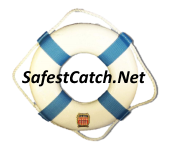About Safest Catch
SafestCatch.net is a web-based community committed to safety at sea and sustainable fisheries; Safety first followed closely by quality seafood production.
In a play on the imfamous Deadliest Catch, it is important to look beyond 'made for TV' and look at the real fishermen who are the true stewards of our Nation's resources.
Services
This site is envisioned as a go to source from one lifelong mariner's perspective to follow the maritime industry of the Pacific Northwest/Alaska and provide timely information on Safety Practices, Real World fishing in the North Pacific & Bering Sea, Training/Educational Links, Sustainable Stewardship of our Nation's resources, and more ~ check back regularly as the industry is 'all consuming' and there undoubtedly will always be something new to report on.
Log Book - UW Hilborn 2/5/15
Bering Sea Hilborn 2/5/2015
SafestCatch.Net ~ Safest Catch dot Net

Bering Sea health: Fishing is not a threat
Posted by Letters Coordinator
In their guest column “Saving ocean habitat before it’s drained, Opinion, Feb. 1,” the authors suggest that protecting the Bering Sea canyons would help “save the oceans.” While it is true that the oceans are threatened in many ways, the Bering Sea is not threatened by fishing. It is in fact one of the best-managed fisheries in the world, with annual harvests well below scientific advice on what is sustainable.
National Oceanic and Atmospheric Administration research has shown there is nothing unique about the flora and fauna of these canyons, and they are not heavily fished. Only about 30 percent of the Bering Sea is impacted by bottom trawling, and the seafloor of the Bering Sea is relatively resilient to trawling.
The real threats are from ocean acidification, global warming, pollution, land-based runoff and unregulated fishing. Closing sections of the Bering Sea to fishing would have no impact on any of these. If the authors must focus on fishing, then they should look to the places in the world where fisheries are poorly regulated.
Ray Hilborn, UW professor School of Aquatic and Fishery Sciences
Deadliest Catch meets Safest Catch ~ real fishermen pursuing safety and sustainability.
































